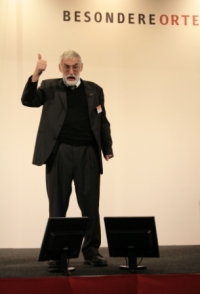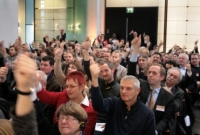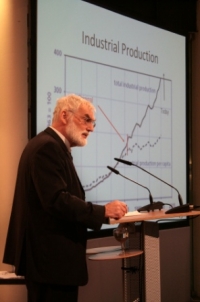Dennis Meadows - Wachstum, Wachstum und kein Ende?
Dennis L. Meadows (geb. 1942) war Professor am Massachusetts Institute of Technology der Universität Cambridge, am Dartmouth College und an der Universität New Hampshire. Er lehrte Ingenieurswissenschaften, Management und Sozialwissenschaften. Heute ist er Emeritus und Leiter des Laboratory of Interactive Learning in New Hampshire. Meadows ist Co-Autor der vom Club of Rome in Auftrag gegebenen Studie „Die Grenzen des Wachstums" (1972/2006), eines der ersten Bücher, das auf den Widerspruch zwischen Wirtschaftswachstum und Endlichkeit der natürlichen Ressourcen hinweist. Zudem ist er Mitglied des Club of Vienna und Mitbegründer der Balaton Group. 2009 wurde er mit dem Japan-Preis ausgezeichnet.
Kurzfassung des Vortrags
"Most citizens in the industrialized nations have come to believe that the physical expansion of the global economy is inevitable. But when faith conflicts with reality, the latter eventually prevails. Growth will soon come to an end along one of two paths. Either humanity can turn to the pursuit of quality rather than quantity, or problems such as climate change and oil depletion will bring on stagnation and decline despite our best efforts to sustain a rising GDP. The first path gives us a chance to achieve many of humanity's basic goals. The second holds the potential for enormous strife, frustration, and dislocation.
The unfolding economic crisis that started last year will not soon disappear. It is just one example of the problems that will grow until population and material growth have been brought to an end within the capacities of the planet. There will be more changes in economy, politics, and environment over the next twenty years than we have witnessed during the past century. Countries and regions that assume they can pass through this period unscathed simply by pursuing traditional policies will suffer - massively. Degrowth is no longer a philanthropy you undertake for others; it is an essential strategy for survival.
There is no possibility to support 7-9 billion people on this planet at material consumption levels similar to those witnessed in the richer countries today. But starting now an ernest effort to shift from quantitative to qualitative development could permit some regions to minimize the damage to their own standards of living and environment that they will otherwise sustain as we enter the period of human history that witnesses a transition to negative growth rates.
The coming decades can be either a severe trial or they can be an opportunity for humanity to refocus on its essential goals."
Dennis Meadows will describe the system structures that have brought exponential growth in industrial output to the richer areas of the world and explain the forces that will arise over the coming decades to stifle that growth. Using climate change as an example, he will illustrate the relation of science to politics in determining future options. He will suggest that contemporary critics of growth predicate their calls for change on a wrong assumption. "We should not question growth because we want to do something useful for others later. We urgently need to revise our policies to secure our own future welfare."
Dennis L. Meadows








